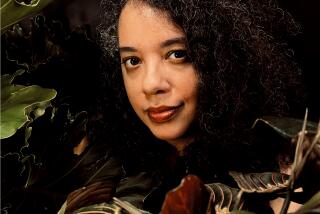BLACK BODY <i> by H.C. Turk (Villard Books: $19.95; 517 pp.) </i>
- Share via
“Black Body” is the intricate and lubricious tale of Alba, a young witch caught in the schemes of an 18th-Century English noblewoman. If there is a theme to “Black Body,” it is the familiar moral revelation that human society is intolerant of deviation and implacable in its drive to exterminate the foreigner. In more capable hands, this might have been an interesting tale. The author’s crude, unmercifully drawn out scenes of sodomy, bestial and otherwise, are unfortunately more memorable than his clever invention of the race of witches.
The story is told through Alba’s eyes as she awaits execution. Alba is a freak among witches, a white witch who can pass for human but is deadly to any man who falls prey to her irresistible attractions. Lady Amanda Rathel seeks revenge against a man who has jilted her, and when fortune reveals to her the secret of the white witch, she takes the orphaned girl as ward (Alba’s mother has recently been burned at the stake). Lady Rathel arranges to marry Alba off to her enemy’s son, thereby ensuring his demise.
Witch though she is, Alba is portrayed as an innocent child of nature. Born in the wilds, she is suddenly introduced to London society, where she attempts to decipher the social codes and artifices of the English aristocracy. Lady Rathel schools her in the appearances and guiles of womanhood, the better to catch her prey. One of the devices used to etch Alba’s alien character is a superhuman sense of smell (seemingly lifted from Patrick Suskind’s “Perfume”) that allows witches to nose out the hidden emotions of “sinners,” their term for ordinary mortals. When Alba and her intended meet at the opera, she is beside herself with discomfort, having been got up in “strung oyster droppings,” the most innocuous of the innumerable anal allusions that underlie the novel like a basso continuo line.
More to Read
Sign up for our Book Club newsletter
Get the latest news, events and more from the Los Angeles Times Book Club, and help us get L.A. reading and talking.
You may occasionally receive promotional content from the Los Angeles Times.






